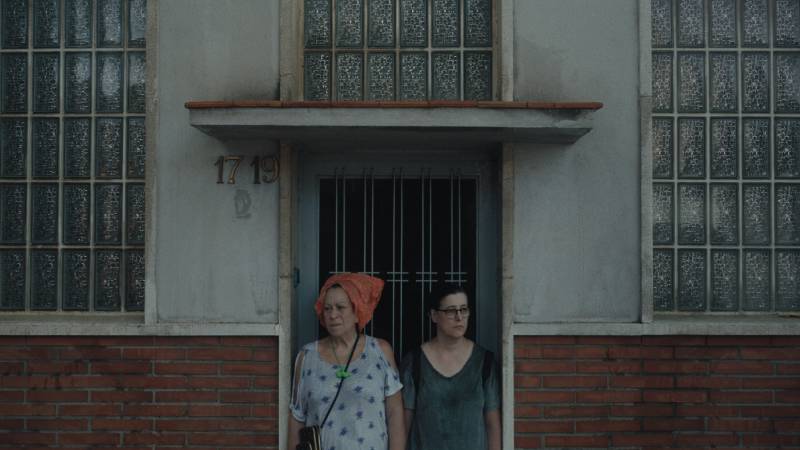




The story begins 5o years ago in Andalusia. Teenage mother Antonia lives in a closely-knit, destitute rural community. Her mother Milagros, her baby, the local priest and a few young women are the only ones around. The almighty Catholic Church has a firm grip on people’s lifestyle and behaviour. Females are quiet, demure and barely literate. Their biggest source of entertainment is an image of the Virgin of Carmel, a local patron saint, on fluorescent paper. This is post-war, Francoist Spain: an impoverished nation with a deeply religious regime that actively discourages individuality, in favour of very conservative values. The setting and the demeanour of the characters look medieval, a far cry from modern-day Spain. there is no room for dissent and rebellion. Perhaps precisely for that reason, Antonia simply vanishes in the middle of the night, leaving behind her baby. And she is never to return.
Fast forward five decades. Antonia (now played by Antonia Ortega, in a viscerally enthralling performance) lives in progressive and Cosmopolitan Catalonia. Only two in every 10 locals describe themselves as conservative, the movie reveals. She is a perfume merchant going from door to door with her little wheeled suitcase in search of clients. One day, she attempts to sell her products inside a publicity agency, her image inadvertently captured by the company’s internal CCTV. The top publicists decide that she perfectly embodies authenticity, and send shy casting director Carmen (Maria Luengo) on a mission to locate the mysterious, elusive woman. Despite a few tribulations, she eventually succeeds. The two quiet characters bond in their loneliness, with Carmen learning some life lessons from Antonia’s spontaneity, and intense joie-de-vivre. Her biggest challenge is convincing her new friend to accept the publicity gig, which comes with generous payment attached. “I already have a job”, explains Antonia, who is perfectly satisfied with the petty money that she gets from her casual, poorly remunerated work.
The experience of the migrant is one of the film’s main pillars. Antonia is barely the same person as five decades earlier. She has been almost entirely reshaped by her new society. She has however retained at least one characteristic of her youth: the Catholic stoicism. She advises Carmen, repeating verbatim the proverb that the Andalusian priest once uttered: “When it comes to your health, it’s in the hands of God”. A migrant learns the hard way to accept the inevitabilities of life, such as senescence. The human body is a temple that gradually falls into disrepair.

The conflict between the passing of time and the titular “picture” (printed or digital) is another one of the film’s central topics. We watch people that never existed morph into one another thanks to artificial intelligence. The see old, black-and-white pictures of yore acquire a ghostly spectrum due to double exposure. And we see our two protagonists fuse into one character on a semi-mirror glass (in a fabulously simple and affecting shot). The rich commentary on the power and the mortality of the image is achieved through very unpretentious narrative and technical devices. there is no elaborate wizardry. Aesthetically, The Permanent Picture has the spartan elegance and the palpable naturalism of Ulrich Seidl: the wide shots, the static camera, the lengthy takes, the slow action. The characters are socially awkward and strangely fascinating in equal measures, much like in the fiction films authored by the Austrian filmmaker. And the story is credible. The frank portrayal of old age is another common trait that deserves a mention.
To boot, Spanish politics are a topic. The film briefly showcases pictures of Spanish of socialist leaders Felipe Gonzalez and Pedro Sanchez, while also reflecting on the “change” that they promised, and what they actually achieved since Spain was rescued from the ravages of fascism. Franco died in 1975, and Gonzalez is widely credited with the rapid modernisation of the nation. We are subtly reminded that the left wing too has to rely on publicity in order to win the hearts of voters, and that too has an impact on the genuineness of their message. There is a palpable conflict in the relationship between publicity and authenticity. It may not be possible to convey the perfect image while also remaining true to oneself. This paradox applies to both the agency’s mission to find an authentic person such as Antonia, as well as to the country’s political establishment.
Ultimately, The Permanent Picture asks viewers: does the image have the duty to accurately portray its subject, or should it seek to subvert authenticity instead?
First-time director Laura Ferres has created a visually compelling and emotionally affecting drama bursting with subtleties. Perhaps worth a second viewing. At the age of just 34, this filmmaker has a promising future ahead.
The Permanent Picture premiered in the Official Competition of the 76th Locarno Film Festival, when this piece was originally written. Also showing in November at REC, Tarragona International Film Festival, and in Competition at Tiff Romania.
















